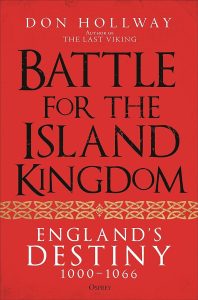While history buffs are likely very familiar with the Norman invasion of England in 1066, they might not know as much about the preceding half century and this epic book fills that gap.
It was a time of violence almost beyond belief, though it might remind readers of early 1900s pogroms in Russia and October 7th in Israel. Raiding Vikings from various countries as far away as what became Poland weren’t satisfied with just burning Anglo-Saxon towns and cities to ash–even if they’d received gold and silver as ransom. They raped women and cut off their breasts, threw victims into fires to burn alive, speared babies to death or smashed their skulls, and hanged men by their privates when they weren’t beaten, clubbed, or hacked to death. The survivors often became slaves.
Strife seemed almost constant, with Anglo-Saxon and Viking armies “marching back and forth and up and down the length of England for years, each time inflicting punishment on whatever unlucky locals got in their way, for not having sufficiently resisted the previous conquerors.” And as if that wasn’t bad, in Normandy, nobles were known to “tear each other to shreds and destroy themselves, for they lust after rebellion, love sedition, and indulge willingly in treachery.”
In both countries, alliances between factions and families could shift with stunning speed, oaths were followed by betrayals that were followed by promises of fealty, exiles and returns were as common as brothers having their own brothers murdered and treasuries raided. Feuds simmer and erupted and died down again, only to savage a new generation.
In these sometimes hellish landscapes, castles were besieged and destroyed and rebuilt, farms were burned, cattle slaughtered, and danger and death were omnipresent–and likewise disease, since the Anglo-Saxons had no understanding of hygiene. They used water riddled with garbage, human waste, and animal corpses. “Random death was so common in England that the Anglo-Saxons had a word for it, aelfscot, ‘elf shot,’ struck down by an invisible, otherworldly arrow.”
And among the various kings, lords, and chieftains on both sides of the English Channel (or “The Southern Sea”) there were plots, coups, murders, betrayals, assassinations and enough violence to make the series Vikings look like something from the Disney Channel.
Parallel to all this madness and dislocation was the quiet, steady, painstaking work of monks copying manuscripts in scriptoriums, work that was encouraged by Alfred the Great to save such treasures for posterity. That very human impulse to save learning and wisdom is both touching and fragile, because raiders had no use for books and loved burning them.
There’s what seems like a cast of thousands here and the names like Aelgifu are hard to scan, but the author does a decent job of individualizing people and separating legend from fact, as well a immersing you in a period that is at times both familiar and utterly alien. Hollway is especially good at charting the changing names of places from Latin to Danish to Old English and Modern English, helpfully explaining the roots of those names. All the same, the fusillade of names can sometimes be exhausting, especially when someone has two or more different names. And there’s way too much speculation about what people might have done or said or felt.
Beyond that, this book that has two main faults, both of them inexplicable: there are no maps and no genealogies whatsoever, so it’s hard to picture where cities, counties, and countries are located when they’re mentioned, and hard to remember who’s related to whom–and how. ★★★
Lev Raphael has reviewed books for The Washington Post, The Detroit Free Press and other news outlets as well as for several NPR radio stations, one of which hosted his interview show with guests like Salman Rushdie and Erica Jong.

